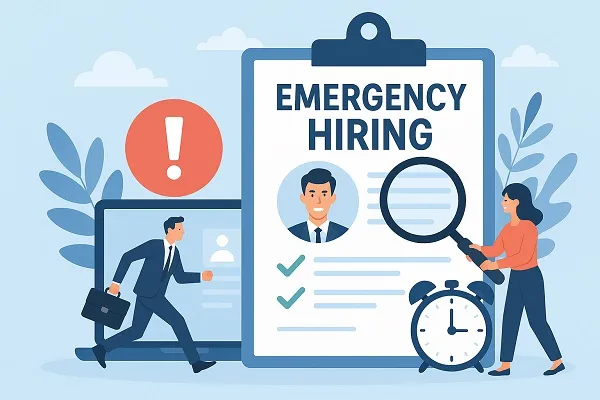In today’s unpredictable business landscape, emergency hiring is more than a contingency plan—it’s a critical business function. Whether due to sudden resignations, seasonal spikes, or urgent project demands, companies often need skilled professionals on very short notice. This is where staffing agencies excel, offering rapid and reliable hiring solutions to bridge the gap.
What Is Emergency Hiring?
Emergency hiring refers to the expedited recruitment of employees to fill urgent vacancies or meet unexpected surges in workload. These hires can be temporary, contract-based, or temp-to-perm depending on the situation.
Common triggers include:
- Sudden employee turnover
- Medical or maternity leave coverage
- Project launches or rollouts
- Seasonal business demands
- Natural disasters or health crises
In such cases, speed and accuracy are critical—delays can mean lost revenue, operational setbacks, or reduced client satisfaction.
The Role of Staffing Agencies in Emergency Hiring
Staffing agencies are uniquely positioned to handle emergency hiring efficiently. With vast talent pools, established vetting processes, and industry-specific expertise, they act as strategic partners in workforce management.
Key Advantages Staffing Agencies Offer:
- Speed: Agencies maintain ready-to-deploy candidates for various roles.
- Flexibility: Temporary, part-time, or freelance talent can be sourced as needed.
- Reduced Risk: Pre-screened candidates lower the risk of bad hires.
- Industry Expertise: Specialized agencies understand the nuances of different sectors.
How Staffing Agencies Mobilize Fast

When emergency hiring needs arise, staffing firms activate a multi-step process to deliver results quickly without compromising on quality.
1. Talent Pool Readiness
Agencies continually build and update their databases with qualified professionals. These candidates are:
- Pre-screened for skills and background
- Categorized by industry and role type
- Available for immediate deployment
This proactive approach eliminates delays caused by traditional recruitment cycles.
2. Streamlined Onboarding
Speedy hiring requires equally fast onboarding. Agencies:
- Handle paperwork and compliance
- Assist with background checks and references
- Coordinate with HR teams for seamless integration
This means the candidate can start working within hours or days.
3. Tech-Driven Recruitment
Modern staffing agencies leverage AI and automation to match candidates with job openings almost instantly. Features include:
- Resume parsing
- Skill-based matching
- Real-time availability tracking
These tools significantly reduce the time between job request and candidate placement.
When Do Businesses Need Emergency Hiring?
Some sectors are more likely to require urgent hiring solutions. Here are a few examples:
Healthcare
- Nurse or physician shortages
- Emergency room surges
- Staff illness or burnout
Retail and Hospitality
- Holiday rush periods
- Event staffing needs
- Sudden no-shows
Manufacturing and Logistics
- Supply chain disruptions
- Large order fulfillment
- Equipment operator absence
In each case, staffing agencies help maintain business continuity.
Benefits of Emergency Staffing for Employers
Engaging a staffing agency for urgent hiring needs provides several business advantages:
- Time Savings: HR teams can focus on core functions while the agency manages recruitment.
- Quality Talent: Agencies have access to niche professionals not always visible in public job markets.
- Scalability: Workforce size can be adjusted quickly without long-term commitments.
- Compliance Assurance: Agencies manage labor laws, tax documentation, and worker classification.
Best Practices for Working with Staffing Agencies

To make the most of emergency staffing partnerships, businesses should:
Communicate Clearly
- Define role requirements
- Specify duration and start time
- Share workplace expectations and environment
Establish Trust
- Choose agencies with a proven track record
- Look for industry certifications and testimonials
- Maintain regular contact during the hiring process
Prepare Internally
- Have onboarding materials ready
- Assign a team member to assist with candidate integration
- Provide immediate feedback on performance
Temporary vs. Permanent Solutions
While emergency hires are often temporary, they can lead to long-term employment. Staffing agencies can support both models:
- Temporary Staffing: Fills short-term gaps without long-term obligations
- Temp-to-Perm: Allows employers to assess fit before offering permanent roles
- Direct Hire: Agencies can source permanent staff quickly if needed
This flexibility ensures businesses have access to the right talent at the right time.
The Future of Emergency Hiring
With increasing reliance on the gig economy and remote work, emergency staffing is becoming more dynamic. Staffing agencies are evolving to meet these demands through:
- Remote Talent Pools: Access to professionals across time zones
- On-Demand Staffing Platforms: Instant candidate matching
- Predictive Analytics: Forecasting hiring needs before they become critical
These trends will continue to shape how organizations approach workforce agility.
Ready When You Are
In high-stakes business environments, delays in staffing can be costly. Staffing agencies provide a lifeline for companies facing urgent hiring challenges. By leveraging their speed, resources, and expertise, businesses can stay resilient and responsive—no matter what comes their way.
Content reviewed and published by Tier2Tek Staffing Editorial Team .
References
- U.S. Bureau of Labor Statistics. Temporary Help Services
- American Staffing Association. Staffing Statistics
- SHRM. Emergency Preparedness in HR
Content reviewed and published by Tier2Tek Staffing Editorial Team .

